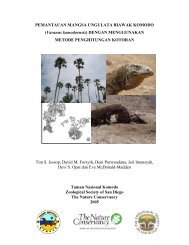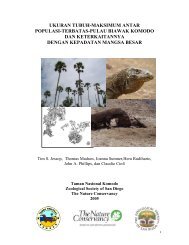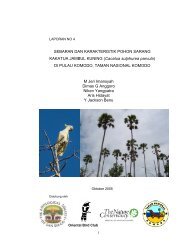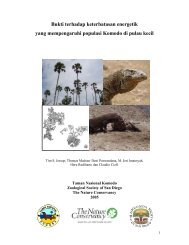Sustainable Financing of MPAs - Komodo National Park
Sustainable Financing of MPAs - Komodo National Park
Sustainable Financing of MPAs - Komodo National Park
You also want an ePaper? Increase the reach of your titles
YUMPU automatically turns print PDFs into web optimized ePapers that Google loves.
or not – for entering the park (Pandaya 2000). The laws and the regulations concerning the<br />
park are enforced by the park authorities. There are five marine patrol units to protect marine<br />
territory and to prevent illegal entrance to the park. Since the initial implementation in 2002,<br />
the coastal patrol has been able to prevent and apprehend several violators, including cyanide<br />
and bomb fishermen. The presence <strong>of</strong> five units <strong>of</strong> Ujung Kulon coastal patrol has also shown<br />
impacts on recovery and re-colonization <strong>of</strong> coral reefs in certain areas within Ujung Kulon<br />
marine territories. However this operation is working on a very slender budget and now<br />
requires additional financial support to operate fully (UNESCO-WHC).<br />
4.2.3 Administrative<br />
As mentioned before, there is a participatory management plan for Ujung Kulon <strong>National</strong><br />
<strong>Park</strong> (Putro 2001). Assisted by Indonesia’s Forestry Department and local NGOs, the site<br />
demonstrates participatory planning approaches, innovative training programs for residents<br />
and park staff, partnerships with the tourism industry, awareness-raising campaigns for local<br />
communities, and financing mechanisms for ongoing site conservation costs (UNEP/ROAP<br />
2002). The idea is to build up the support from local communities to the conservation <strong>of</strong> the<br />
park and promote sustainable livelihoods by promoting community based initiatives (see<br />
WWF) and community-based eco-tourism (Rachmat Hariyadi).<br />
The management <strong>of</strong> the park needs improvements. Many stakeholders such as local<br />
government, <strong>National</strong> park authority, and NGOs like WWF have tried in many ways to<br />
suppress the negative interaction between people and the park. Household economy and<br />
welfare are identified as the major cause for the negative interaction. Therefore, there should<br />
be a clear role and responsibility <strong>of</strong> stakeholders in park management. Providing sustainable<br />
income generating activities is considered as a means for suppressing the negative interaction.<br />
It may actually shift negative interaction to positive interaction that benefits both nature<br />
(preservation <strong>of</strong> biodiversity) and the people (Rachmat Hariyadi). To improve the<br />
management, staff exchange with the <strong>Komodo</strong> <strong>National</strong> <strong>Park</strong> was initiated. The purpose <strong>of</strong><br />
this staff exchange was to share lessons learned on park patrolling and enforcement (TNC<br />
2004).<br />
4.2.4 Social<br />
Social indicators measure involvement <strong>of</strong> the local communities in the conservation and<br />
protection <strong>of</strong> the park biodiversity and its resources and thereby their acceptance <strong>of</strong> the<br />
financing structure as well as the equitable distribution <strong>of</strong> benefits. Community based<br />
activities in Ujung Kulon <strong>National</strong> <strong>Park</strong> seek to design a strategy to physically defend the area,<br />
stabilize land use, generate wealth, and transfer it directly to the local people. The work<br />
follows the informal and formal structures <strong>of</strong> the villages and in the future will expand to<br />
include fishermen, whose role is presently not emphasized. Currently these operations are<br />
already turning a small pr<strong>of</strong>it, and with the vision <strong>of</strong> becoming a sustainable and pr<strong>of</strong>itable<br />
economic activity, there is need for more financial support. (WWF)<br />
The local community is in many ways participating in the conservation <strong>of</strong> the Ujung Kulon<br />
<strong>National</strong> <strong>Park</strong>. Community participation includes community involvement in the marine patrol<br />
units. Local people are also involved in managing and preserving the traditional utilization<br />
24






